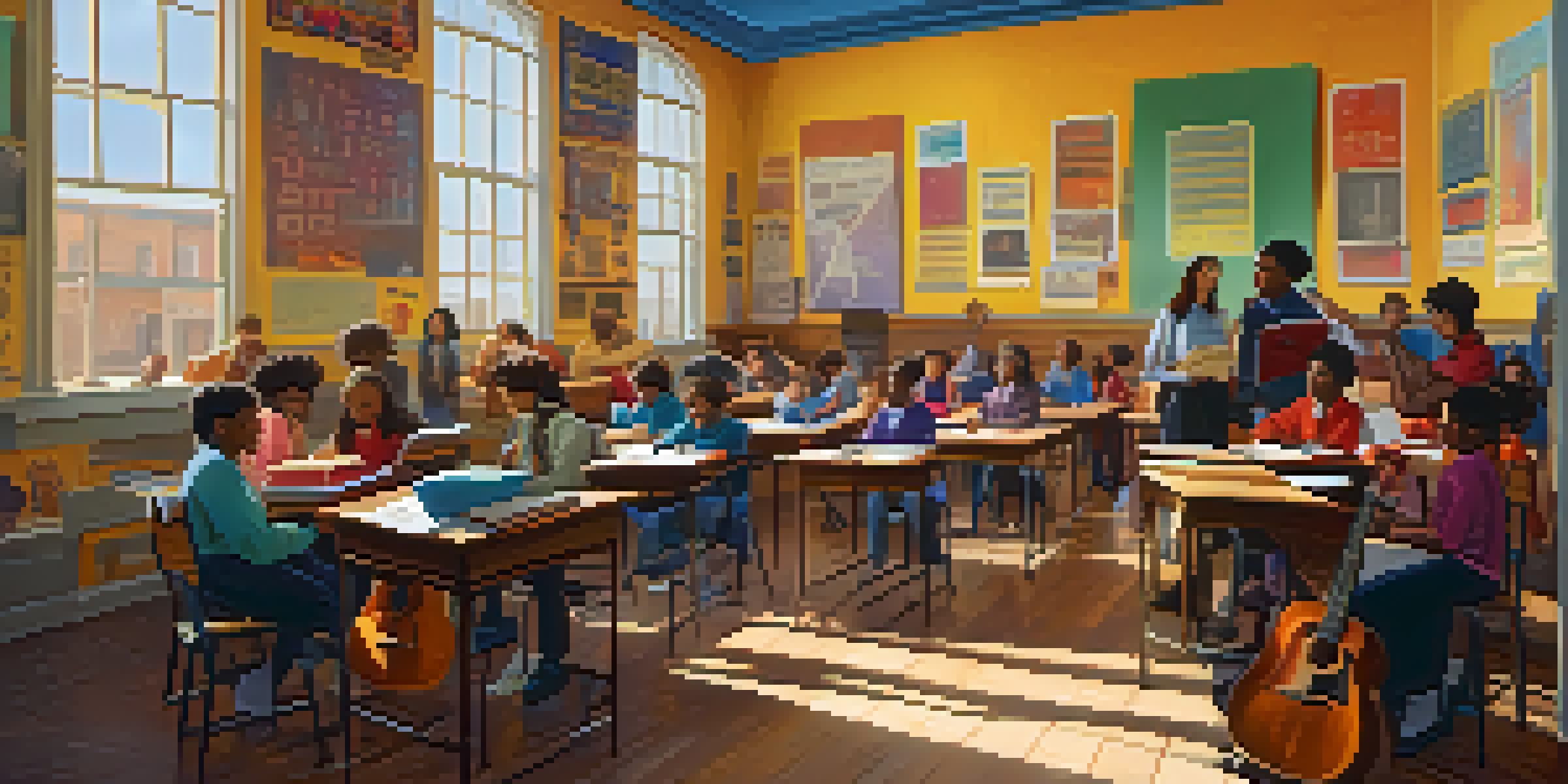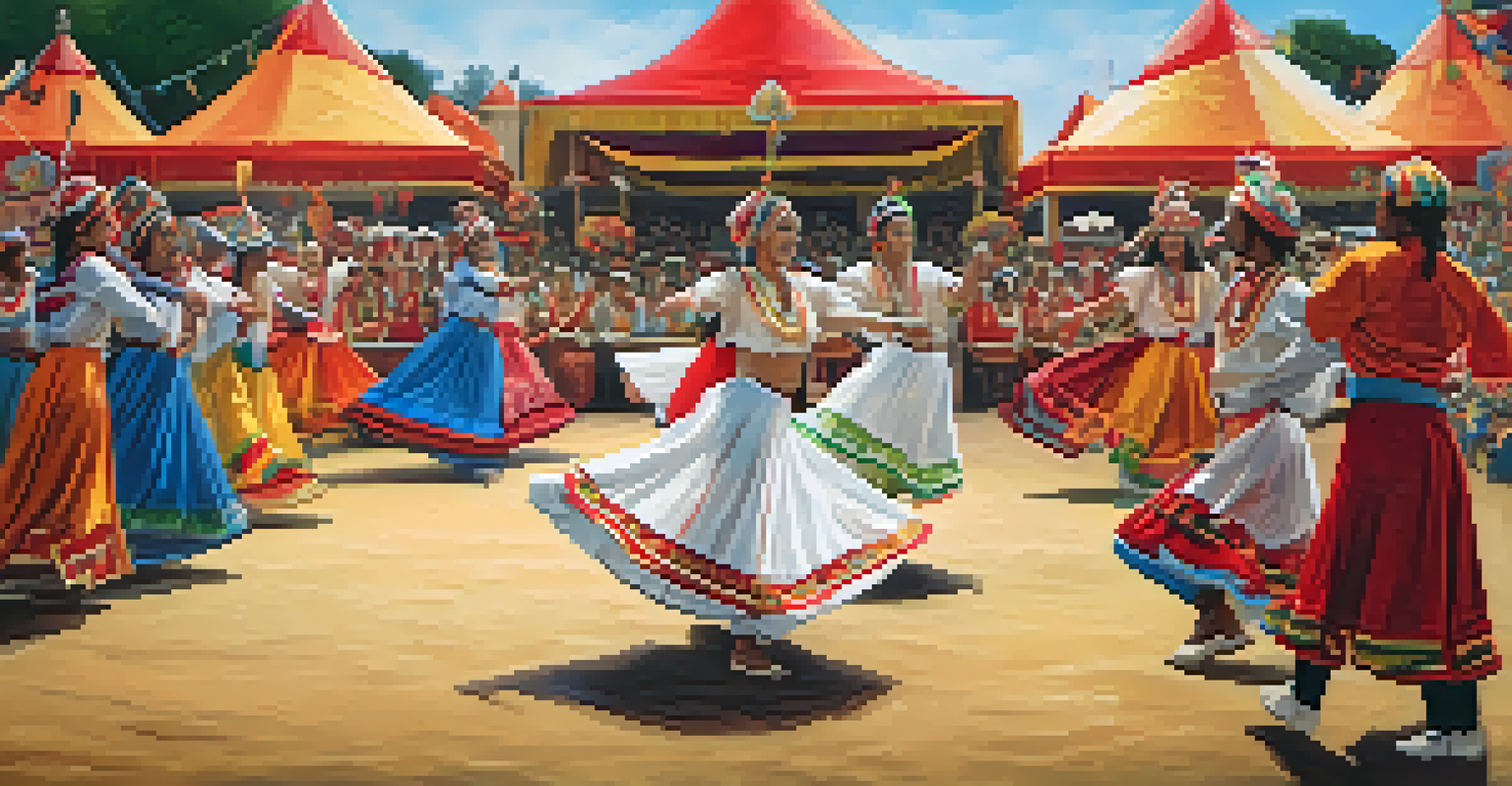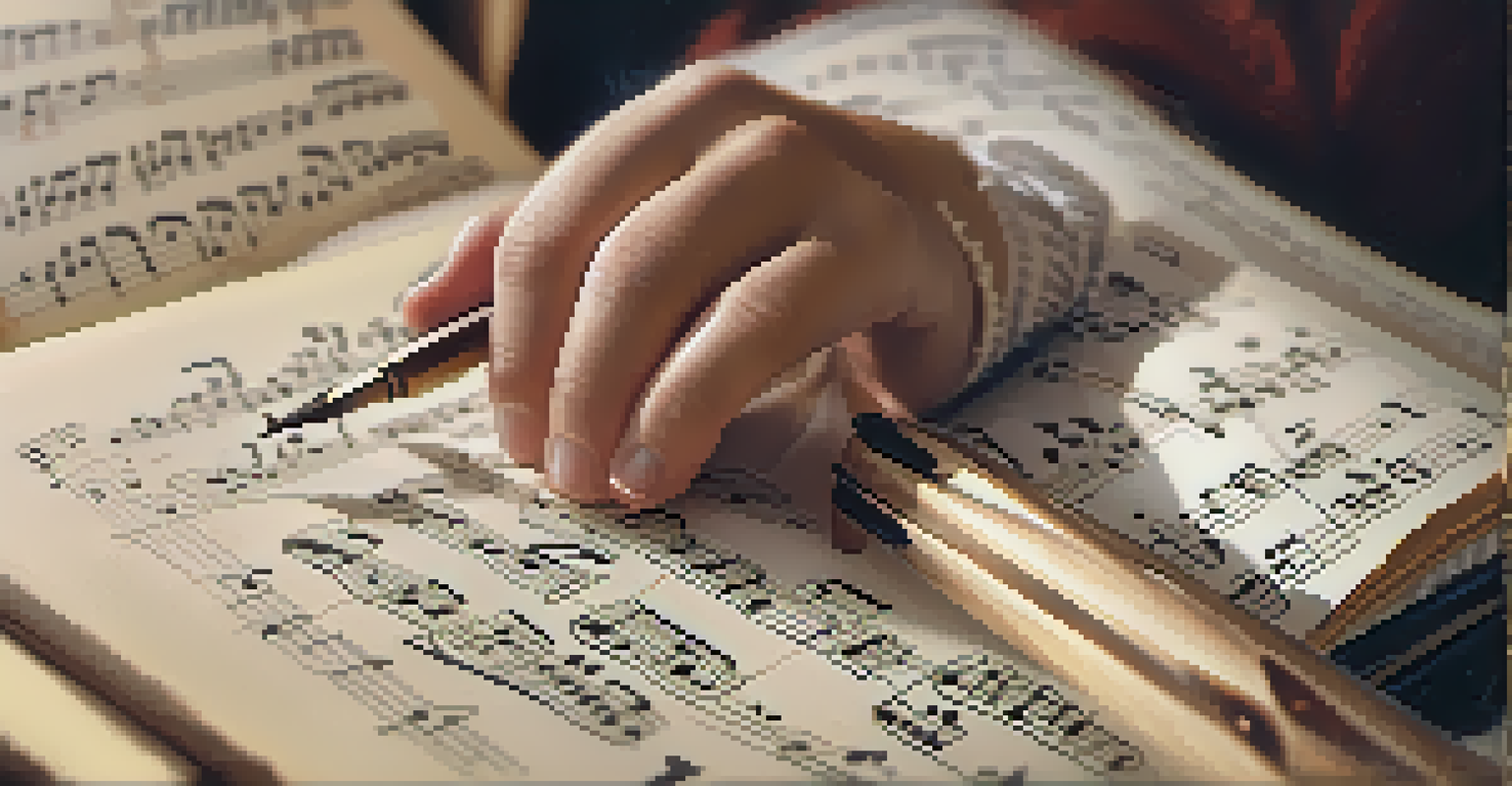Integrating Music Education with Social Studies Curriculum

The Importance of Integrating Music and Social Studies
Integrating music education into social studies offers a unique opportunity for holistic learning. It allows students to explore historical events and cultural movements through the lens of music, deepening their understanding and engagement. For instance, studying the Civil Rights Movement alongside the music of that era can create a more vivid picture of the struggles and triumphs experienced.
Music can change the world because it can change people.
Moreover, music provides a universal language that transcends cultural boundaries. When students analyze the music from different countries and periods, they not only learn about the societies that produced it but also about the values and beliefs that shaped those cultures. This approach promotes empathy and appreciation for diversity, which are essential in today's interconnected world.
Ultimately, integrating these two subjects can foster a richer learning environment. As students connect melodies with historical narratives, they create a tapestry of knowledge that is both memorable and meaningful. This synergy between music and social studies paves the way for more comprehensive educational experiences.
Enhancing Historical Understanding Through Music
Music serves as a powerful tool for enhancing historical understanding, allowing students to engage with past events in a dynamic way. For example, listening to songs from World War II can help students grasp the emotions and sentiments of that time, making history feel more relatable. This auditory experience can evoke powerful feelings that static texts often fail to capture.

Additionally, exploring the origins of various musical genres offers insights into cultural and social contexts. Students can learn about the impact of the Harlem Renaissance through jazz, or how folk music reflects the struggles of the working class. Such connections make history more tangible, encouraging students to think critically about the past.
Music Enhances Historical Engagement
Integrating music into social studies allows students to connect emotionally with historical events, making them more relatable and memorable.
Moreover, integrating music with history encourages active participation. Students can perform songs, analyze lyrics, or even create their own compositions based on historical events, transforming passive learning into an interactive experience. This approach not only solidifies their understanding but also nurtures creativity.
Cultivating Cultural Awareness Through Musical Exploration
Exploring music from different cultures enriches social studies by cultivating cultural awareness. When students listen to traditional songs from various regions, they gain insights into the customs and values of those cultures. This exploration fosters respect and curiosity, encouraging students to embrace diversity.
Education is not preparation for life; education is life itself.
For instance, examining the role of music in festivals around the world can illustrate how art and history intersect. Students might study the significance of the Diwali festival in India alongside its traditional music, creating a multidimensional understanding of cultural practices. Such lessons can also prompt discussions about globalization and cultural exchange.
Furthermore, integrating music education in this way helps students develop a more nuanced perspective on current global issues. By understanding the roots of different musical traditions, they can better appreciate the complexities of today's cultural dynamics. This skill is invaluable in a world where cross-cultural interactions are increasingly common.
Fostering Empathy Through Music and History
One of the most significant benefits of integrating music education within social studies is its ability to foster empathy. Music can convey emotions that written words often fail to express, allowing students to connect with historical figures and events on a personal level. When students listen to songs that reflect suffering or resilience, they begin to understand the human experiences behind historical narratives.
For example, studying the music of the Holocaust can evoke profound feelings of sorrow and reflection. This emotional connection helps students grasp the gravity of such events, encouraging them to think critically about morality and justice. By empathizing with those who lived through history, students become more informed and compassionate citizens.
Fosters Empathy and Cultural Awareness
Through music exploration, students develop empathy and a deeper understanding of diverse cultures, which is vital in today's interconnected world.
Moreover, empathy cultivated through music can extend beyond the classroom. As students learn to appreciate diverse perspectives, they are better equipped to engage in constructive dialogue about social issues today. This underscores the importance of integrating music education into social studies, as it not only enriches learning but also shapes character.
Promoting Collaborative Learning Through Musical Activities
Musical activities can promote collaborative learning, a vital aspect of both music education and social studies. Group projects involving song creation or performance encourage students to work together, share ideas, and respect each other's contributions. This teamwork mirrors the cooperative spirit often found in social movements throughout history.
For instance, students might collaborate to create a musical piece that represents a specific social issue, such as climate change. This project not only enhances their understanding of the issue itself but also fosters a sense of community as they brainstorm and create together. Such collaborative efforts help build essential skills like communication and problem-solving.
Additionally, these activities can break down social barriers, fostering friendships among students from diverse backgrounds. When students unite to express themselves through music, they develop a deeper appreciation for each other's perspectives. This sense of belonging enhances the classroom environment, making it a more inclusive space for learning.
Utilizing Technology to Integrate Music and Social Studies
In our digital age, technology offers exciting opportunities to integrate music education with social studies. Online platforms provide access to a wealth of musical resources, from streaming historical performances to interactive music creation tools. This accessibility allows students to explore music in ways that were previously unimaginable.
For example, virtual field trips to museums or music festivals can enhance students' understanding of different cultures. Programs that allow students to create podcasts or videos about musical history can also foster creativity while reinforcing their learning. These technological tools can make lessons more engaging and relatable.
Promotes Collaborative Learning
Musical activities encourage teamwork and communication among students, fostering a sense of community and respect for diverse perspectives.
Moreover, technology facilitates collaboration beyond the classroom. Students can connect with peers from around the world to discuss music and history, fostering a global perspective. This integration of technology not only enriches the learning experience but also prepares students for a world increasingly shaped by digital communication.
Assessing the Impact of Music Integration on Learning Outcomes
Assessing the impact of integrating music education with social studies is essential for understanding its effectiveness. Educators can evaluate students' engagement and comprehension through various methods, such as surveys, performance assessments, and reflective essays. This feedback can guide future curriculum development and teaching strategies.
For instance, teachers might notice improved retention of historical facts when students learn through music. Additionally, students may demonstrate enhanced critical thinking skills as they analyze lyrics and their historical contexts. These observations can serve as indicators of successful integration.

Ultimately, ongoing assessment helps educators refine their approaches and ensure that students are gaining valuable skills. By continuously monitoring learning outcomes, educators can create a more impactful and engaging curriculum. This commitment to improvement underscores the importance of integrating music into social studies for a well-rounded educational experience.
Conclusion: The Future of Music in Education
The integration of music education within the social studies curriculum opens up a world of possibilities for students and educators alike. By fostering empathy, cultural awareness, and collaborative learning, this approach enriches the educational experience in meaningful ways. As we look to the future, the importance of creative and holistic teaching methods cannot be overstated.
Educational institutions are increasingly recognizing the benefits of interdisciplinary learning, and music is a crucial component of that shift. As more teachers embrace this integration, students will gain a more comprehensive understanding of the world around them. This not only prepares them for academic success but also equips them to navigate an ever-changing global landscape.
In conclusion, the marriage of music and social studies is not just an innovative teaching strategy; it’s a pathway to deeper learning and understanding. As we continue to explore the intersections of these subjects, we lay the groundwork for a richer, more engaging educational experience that resonates with students long after they leave the classroom.